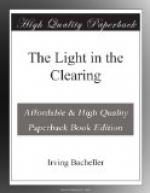“Is this the hero of Plattsburg?” Mr. Wright asked.
“Well, I have been there,” said the General.
They shook hands and went up to the house together.
I walked back to the hills that evening. There I found a letter from Sally. She and her mother, who was in ill health, were spending the summer with relatives at Portsmouth, New Hampshire. She wrote of riding and fishing and sailing, but of all that she wrote I think only of these words now:
“I meet many good-looking boys here, but none of them are like you. I wonder if you remember what you said to me that day. If you want to unsay it, you can do it by letter, you know. I think that would be the best way to do it. So don’t be afraid of hurting my feelings. Perhaps I would be glad. You don’t know. What a long day that was! It seems as if it wasn’t over yet. How lucky for me that it was such a beautiful day! You know I have forgotten all about the pain, but I laugh when I think how I looked and how Mr. Latour looked. He laughed a good deal going home, as if thinking of some wonderful joke. In September I am going away to a young ladies’ school in Albany. I hate it. Can you imagine why? I am to learn fine manners and French and Spanish and dancing and be good enough for any man’s wife. Think of that. Father says that I must marry a big man. Jiminy Crimps! As if a big man wouldn’t know better. I am often afraid that you will know too much. I know what will happen when your intellect sees how foolish I am. My grandmother says that I am frivolous and far from God. I am afraid it’s true, but sometimes I want to be good—only sometimes. I remember you said, once, that you were going to be like Silas Wright. Honestly I believe that you could. So does mother. I want you to keep trying, but it makes me afraid. Oh, dear! How sad and homesick I feel to-day! Tell me the truth now, when you write.”
That evening I wrote my first love-letter—a fairly warm and moving fragment of history. My family have urged me to let it go in the record, but I have firmly refused. There are some things which I can not do even in this little masquerade. It is enough to say that when the day ended I had deliberately chosen two of the many ways that lay before me.
CHAPTER XVI
I USE MY OWN COMPASS AT A FORK IN THE ROAD
Swiftly now I move across the border into manhood—a serious, eager, restless manhood. It was the fashion of the young those days.
I spent a summer of hard work in the fields. Evenings I read the books which Mr. Wright had loaned to me, Blackstone’s Commentaries and Greenleaf on Evidence and a translation by Doctor Bowditch of LaPlace’s Mecanique Celeste. The latter I read aloud. I mention it because in a way it served as an antidote for that growing sense of expansion in my intellect. In the vastness of infinite space I found the littleness of man and his best accomplishments.




